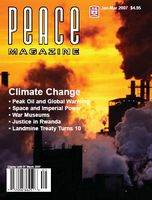
Peace Magazine Jan-Mar 2007, page 30. Some rights reserved.
Search for other articles by Ron Shirtliff here
There is some good news. As reported by Inter Press Service the United Nations General Assembly took the first steps in October 2006 to create an international treaty to curb the illicit trade in guns and light weapons. This action shows a growing world consciousness of the need to put limits on the activities of warring groups and states under international embargos. The aim is to stop illicit weapons transfers that fuel conflicts and result in poverty and violations of human rights.
The resolution grew out of a broad based campaign led by Amnesty International and Oxfam, and was officially sponsored by Argentina, Australia, Costa Rica, Finland, Japan, Kenya and Britain. The great majority of General Assembly nations voted for the motion with only the US voting against it. However, 24 nations, many of them weapons makers, including Russia, China, India, and Pakistan, abstained.
Joining the campaign to launch this initiative, fifteen Nobel Peace Prize-winners signed a letter urging nations to support the resolution.
Supporters hope that this new action will result in an international convention that will have the strength of the successful Ottawa Accord that led to the banning of the use, manufacture, and storage of landmines. On the same hopeful note, another international treaty " the explosive remnants of war" was ratified by the required 20 nations in November 2006 and obligates warring parties to remove unexploded munitions that kill and maim after the fighting is over. And a lot of energy is going into efforts to ban the use of cluster bombs after their recent use by Israel in the end of the battle in Lebanon.
Amnesty's secretary general Irene Khan described the initiative to control small arms trading as "an historic step to stop irresponsible and immoral arms transfers." One might suspect that she and many others will not be satisfied until a major dint is put in the estimated 1.1 trillion dollar free wheeling global arms trade.
Since 9/11 the US and some allies have struck a severe blow against International conventions governing warfare in the treatment of prisoners, notable in Guantánamo, and through renditions to secret prisons around the world. But the world community, through its NGOs and many governments, is continuing to develop international law to bear on the worst practices of the war makers, the killing of innocent civilians, casually classified, and frequently not even counted, as collateral damage.
Ron Shirtliff serves on the editorial board of Peace Magazine.
Peace Magazine Jan-Mar 2007, page 30. Some rights reserved.
Search for other articles by Ron Shirtliff here